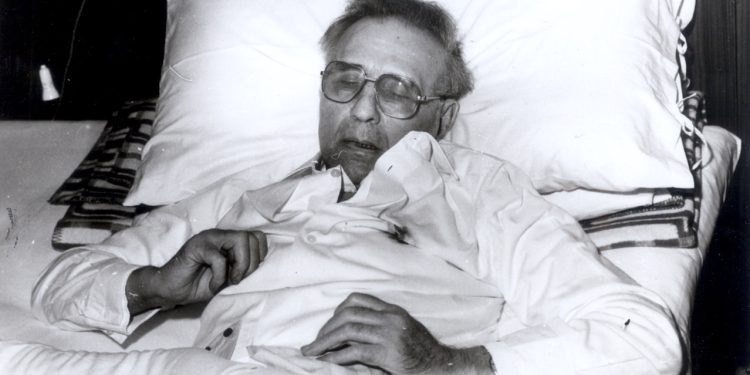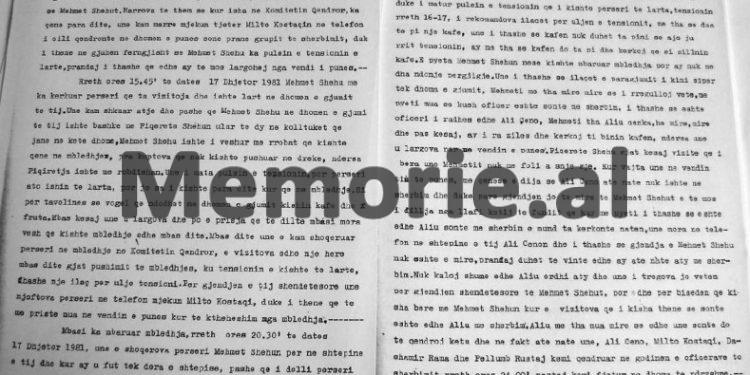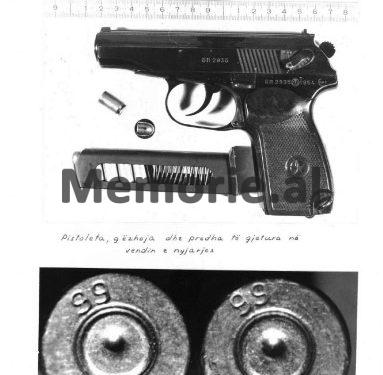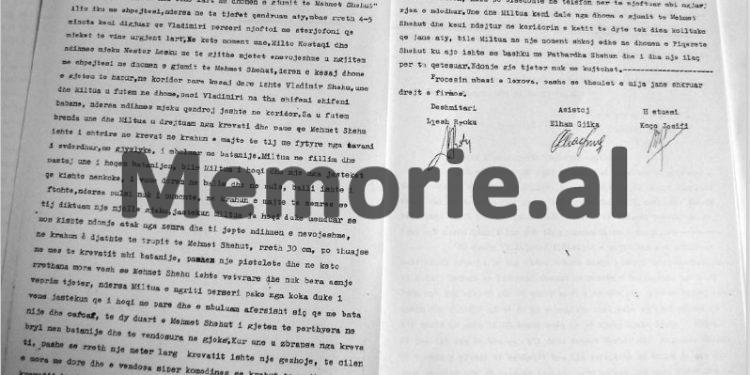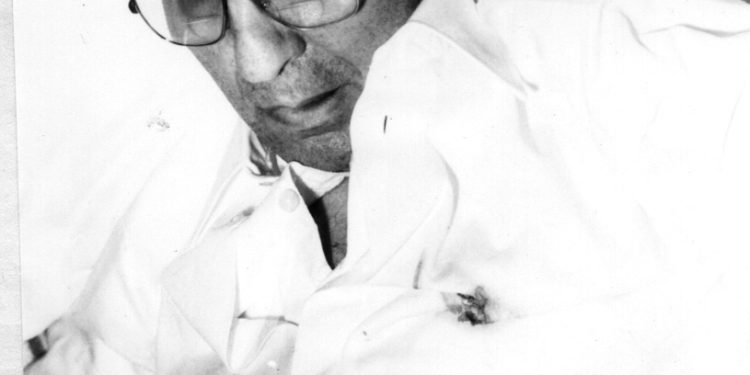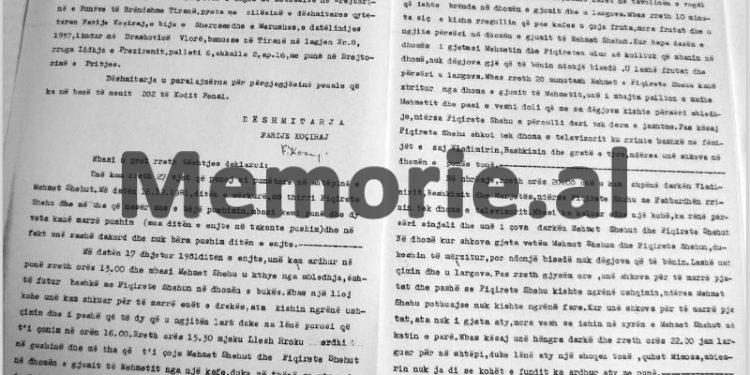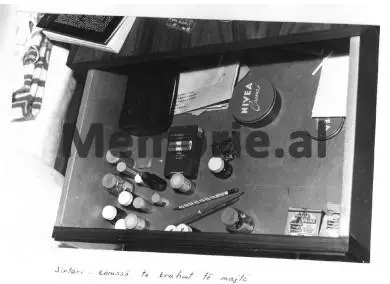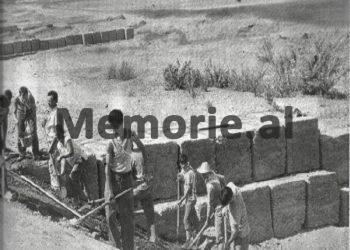By Dashnor Kaloçi
Part Seven
Memorie.al / 43 years ago, at dawn on December 18, 1981, the Albanian Prime Minister Mehmet Shehu, who had held that position since 1953, was found dead in his bedroom (according to the official version, from a gunshot) in the villa where he lived with his family, at the entrance of the “Block” of the high leadership of the Albanian Labour Party, just a few meters from the building of the Central Committee of the Party and also from Enver Hoxha’s villa. Although more than four decades have passed since that day, considered one of the most serious and talked-about events of that regime, there is still no clear and accurate version regarding what happened to the former Albanian Prime Minister, Mehmet Shehu, in the midnight leading to December 18, 1981! Even though after the 1990s, dozens of testimonies and archival documents related to that event have been made public, the “murder or suicide of Mehmet Shehu” continues to be the subject of many debates and discussions, further shrouding the truth in mystery!
Given this fact, within the framework of publishing dozens of testimonies and files with archival documents from the secret fund of the former State Security and the Ministry of Interior, as well as the Central Committee of the Party, which we have published in these three decades after the fall of Enver Hoxha’s communist regime and that of his successor, Ramiz Alia, Memorie.al has secured the voluminous file of the “enemy Mehmet Shehu,” which has been released from the secret fund of the former State Security (under the Ministry of Interior), where with some minor exceptions, most of them have never seen the light of publication and are being published for the first time.
In the mentioned file, there are complete and corresponding facsimiles of the expert report from the operational-investigative group, which was established immediately on the morning of December 18, 1981, led by Koço Josifi (head of the Investigation of the Directorate of Internal Affairs of Tirana), forensic doctors Dr. Fatos Hartito and Docent Bashkim Çuberi, the Prime Minister’s doctors, Milto Kostaqi and Llesh Rroku, as well as the criminal expert from the Central Criminalistics Laboratory of the Ministry of Interior, Estref Myftari, assisted by high officials of that ministry, Xhule Çiraku, Elham Gjika, and Lahedin Bardhi.
In the large file we are making public, there are also testimonies from the family members of former Prime Minister Mehmet Shehu, service personnel, and his entourage, as well as all other individuals who were called in and gave testimony regarding that event. For more regarding this, the mentioned documents inform us, which we are publishing along with the corresponding facsimiles and photos.
Continued from the last issue
ARCHIVAL DOCUMENT WITH THE MINUTES OF THE INTERROGATION OF DR. LLESH RROKU, THE PERSONAL PHYSICIAN OF PRIME MINISTER MEHMET SHEHU, BY THE HEAD OF THE INVESTIGATION IN TIRANA, KOÇO JOSIFI
MINUTES
IN TIRANA, ON DECEMBER 28, 1981
I, Koço Josifi, investigator in the Directorate of Internal Affairs of Tirana, in the presence of my colleague Elham Gjika, questioned the citizen Llesh Rroku, son of Toma and Mara, born in 1948, born in Lezhë, and residing in Tirana, neighborhood No. 8, “4 Shkurti” street, building No. 7, apartment 13, with higher education, serving as a cardiologist for Mehmet Shehu, party candidate.
The witness was warned of the criminal responsibility he holds under article 202 of the Penal Code.
The witness
Llesh Rroku
“…After the meeting ended, I accompanied Mehmet Shehu to his home, where Fiqret Shehu was waiting at the entrance, and together they went to the office on the first floor. Here, I measured Mehmet Shehu’s blood pressure again, which continued to be high.
I told him to rest, as he needed it. He told me he would not rest, and I left and went to my workplace, which is located outside Mehmet Shehu’s residence. Around 15:45 on December 17, 1981, Mehmet Shehu called for me again to visit him, as he was once again in his bedroom.
I went there and saw that Mehmet Shehu, in his bedroom, was with Fiqrete Shehu, both sitting on the couches in the room. Mehmet Shehu was dressed in the clothes he had worn to the meeting, so I understood that they had not rested during lunch, while Fiqretja was in a dress. I measured his pulse and blood pressure, and although they were still high, they were not as high as in the morning when he was at the meeting. On the small table in the bedroom, there was coffee and fruit. After this, I left and waited for him to come out, knowing that there was a meeting later in the day.
In the afternoon, I accompanied Mehmet Shehu to the meeting at the Central Committee and visited him once more during the break, where his blood pressure was high again and I gave him a medication to lower it. For his blood pressure condition, I informed the doctor, Milto Kostaqi, by phone, telling him to expect me at my workplace when I returned from the meeting.
After the meeting finished, around 20:30 on December 17, 1981, I accompanied Mehmet Shehu to his home again, and when he entered through the front door, he saw Fiqret Shehu come out to greet him again. I then left for my workplace, where I told Milto Kostaqi that he should not go home that night because Mehmet Shehu’s pulse and blood pressure were elevated. Milto agreed.”
“Around 21:30 on that date, Mehmet Shehu asked me again to visit him, and when I arrived, I found him in his office on the first floor, along with his wife, Fiqret Shehu. I examined him by measuring his pulse and blood pressure, which were still high; 16-17, and I recommended medication to lower the blood pressure. He told me he wanted to drink a coffee; I advised him not to drink coffee, as it raises blood pressure, but he insisted he would drink it and asked for coffee to be brought to the room. I asked Mehmet Shehu if the meeting was over, but he did not respond. I told him that the sleeping medication was in his bedroom, and he replied that he would manage it himself.
He asked me who the duty officer was that night, and I told him it was the duty officer along with Ali Çeno. Mehmet said, “So Ali is on duty, that’s better,” and after this, he rang the bell and requested coffee for us while I left for my workplace. During this visit I made to Mehmet Shehu, Fiqret Shehu did not say a word to me. When I got to my workplace, knowing that Ali Çeno was not on duty that night and seeing Mehmet Shehu’s poor condition and that of his entire family, in order not to get in trouble, when he asked me, I told him that Ali was also on duty today and that he could be called in at night. I called Ali Çeno at his home and informed him that Mehmet Shehu’s condition was not good and that he needed to come there as well for duty.
It wasn’t long before Ali arrived, and I informed him not only about Mehmet Shehu’s health condition but also about the conversation I had had with Mehmet during my visit, where I had told him that Ali was also on duty tonight. Ali told me it was fine, and we all stayed for duty together. I, Ali Çeno, Milto Kostaqi, Dashamir Rama, and Pëllumb Risto remained in the service building until around midnight, after which we slept in different rooms.
Around 00:30 on December 18, 1981, I fell asleep the entire night and did not feel anything. I woke up in the morning around 6:00, at which time the other officers had also risen. At around 7:55 on December 18, 1981, when everyone was together in the service group in one room, we heard Vladimir Shehu announcing over the intercom that Ali Çeno should come urgently to Mehmet Shehu’s room. Ali rushed out, while the rest of us stayed there, and after 4-5 minutes, we heard Vladimir announce again over the intercom that the doctors should come urgently upstairs.”
“At that moment, I, Milto Kostaqi, and assistant doctor Nestor Lezho, with all the necessary tools, quickly ascended to Mehmet Shehu’s bedroom. We found the door to this room open. In the corridor outside this door was Vladimir Shehu. Milto and I entered the room, while the assistant doctor stayed outside in the corridor after Vladimir told us, ‘Look at Dad.’
As soon as we entered, Milto and I turned towards the bed and saw that Mehmet Shehu was lying on his left side, facing the ceiling, covered with a blanket up to his neck and also with a nightcap. Milto first, and then I, removed the blanket; in fact, Milto even removed one of the pillows from under his head, placed his hand on his forehead and on his pulse. His forehead was cold, and there was no pulse. On the left side of his heart, we noticed a spot of blood.
Milto removed the spot, thinking that he might have had a heart attack and needed assistance. On the right side of Mehmet Shehu’s body, about 30 cm nearly in the middle of the bed, above the blanket, I saw a pistol, and in this situation, I realized that Mehmet Shehu had committed suicide, and we did not perform any further actions. Meanwhile, Milto lifted his head slightly again, placing the pillow that he had previously removed back under it, and we covered him with the blanket and sheet as he was. We found both of Mehmet Shehu’s arms bent at the elbows over the blanket and resting on his chest.
When I stepped back from the bed, I saw a shell about a meter away from the bed, which we picked up and placed on top of the nightstand on the left side of the bed, where Mehmet Shehu’s body was. We did not conduct any additional actions on Mehmet Shehu’s body and his bed, but I would add that when Milto and I entered Mehmet Shehu’s bedroom, we noticed that the door to his office on the second floor, which continues from this bedroom, was open, and at the desk in the office were Ali Çeno and Jonuz Luto. Ali was talking on the phone to report the incident that had occurred.
Milto and I exited Mehmet Shehu’s bedroom and stayed in the corridor on the second floor, by some armchairs that are there. In fact, Milto even entered Fiqret Shehu’s room, where she was with Fatbardha Shehu, and gave her a medication to calm her down. I do not recall anything else.”
After I read the process, I saw that my statements were written correctly, and I signed.
Witness Assisted by Investigator
Llesh Rroku Elham Gjika Koço Josifi
ARCHIVAL DOCUMENT WITH THE MINUTES OF THE INTERROGATION OF FARIJE KOÇIRAJ, SERVICE WORKER IN MEHMET SHEHU’S VILLA, BY THE HEAD OF THE INVESTIGATION OF THE DIRECTORATE OF INTERNAL AFFAIRS OF TIRANA, KOÇO JOSIFI
MINUTES
In Tirana, on December 20, 1981
I, Koço Josifi, chairman of the Investigation Department in the Directorate of Internal Affairs of Tirana, questioned as a witness the citizen Farije Koçiraj, daughter of Shercem and Merusha, born in 1937, born in Drashovicë Vlorë, residing in Tirana, in neighborhood No. 8, “Lidhja e Prizrenit” street, building 6, stairwell 2, apartment 16, employed in the Reception Directorate.
The witness was warned of the criminal responsibility she holds under article 202 of the Penal Code.
WITNESS STATEMENT
FARIJE KOÇIRAJ
After being questioned about the matter, she declared:
“I have worked for about 27 years as a worker in the house of Mehmet Shehu. On December 16, 1981, Wednesday, Fiqret Shehu called me and told me that tomorrow I should not take a day off, as we have work and two others have taken a day off (my day off was on Thursday), and in fact, I agreed and did not take a day off on Thursday.”
“On December 17, 1981, Thursday, I arrived at work around 13:00, and after Mehmet Shehu returned from the meeting, he entered the dining room with Fiqret Shehu. After a while, I went to get the lunch dishes; they had eaten their food, and I saw them both going upstairs, leaving instructions for us to take them at 16:00.
Around 15:00, doctor Llesh Rroku came into the kitchen and told me to take Mehmet Shehu and Fiqret Shehu coffee in the bedroom, saying they hadn’t laid down to rest, so take them coffee.
I took the coffee and went upstairs to Mehmet Shehu’s bedroom. When I opened the door to the bedroom and entered, I saw him walking around the room dressed in a suit, while Fiqrete Shehu was sitting in an armchair dressed in a nightgown. As I entered with the coffee, they did not engage in any conversation; I left the coffee on the small table inside the bedroom and left.
After ten minutes, as was customary, I brought fruit after the coffee. I took the fruit and went up again to Mehmet Shehu’s bedroom. When I opened the door to the bedroom, I found Mehmet and Fiqrete sitting on the armchair that was in the room; I did not hear them engage in any conversation. I left the fruit and again left.
After about 20 minutes, Mehmet and Fiqrete came back down from Mehmet’s bedroom. I held Mehmet’s large coat for him, and after he put it on, he went out; as far as I heard, there was another meeting, while Fiqrete Shehu saw him off to the outside door. After this, Fiqrete Shehu went to the television room, where she stayed with her children, Vladimir, Bashkim, and their wives, while I went to our work room.
In the evening around the time I took dinner to Vladimir, Bashkim, and Marjeta, while Fiqrete Shehu and Fatbardha were in the television room. After some time had passed, the signal went off again, and I took dinner to Mehmet Shehu and Fiqrete Shehu. When I went into the room, I found only Mehmet Shehu and Fiqrete Shehu; they appeared to be upset, but I did not hear them engage in any conversation. I left the food and departed.”
“After about half an hour, I went to get the dishes and saw that Fiqret Shehu had eaten the food, while Mehmet Shehu had hardly eaten at all. When I went to get the dishes, I didn’t find them there; I learned that they were in Mehmet Shehu’s office on the first floor. After this, I had my dinner, and around 22:00, I left for home, leaving behind a friend of ours named Mimoza; I don’t know her last name, as she has recently started working there.
On December 18, 1981, I arrived at work around 6:30 AM, and together with the cook, we were preparing breakfast. Vladimir Shehu left for work, while Bashkim Shehu I was told had left for work before I arrived. Around 8:00 AM, the duty officer, Jonuz Lato, came down to the kitchen, where the entire service staff was. He was very agitated, and I asked him what was wrong. He didn’t respond immediately, but then told me that Mehmet Shehu had committed suicide.
I went upstairs to the second floor and noticed that in Mehmet’s office there was officer Ali Çeno, and doctors Milto Kostaqi and Llesh Rroku. In Fiqrete Shehu’s bedroom, the door was open, and I saw Fiqrete Shehu, Vladimir, and Fatbardha, who were crying and saying, ‘Why did he do it? He shouldn’t have done it.’ At this time, Ali Çeno was on the phone; I don’t know who he was talking to. Then Ali came out of Mehmet Shehu’s office and there in the corridor, I heard him say to Fiqrete: ‘The letter that was made, bring it here, because the friends will come to take it tonight.’ I left and do not know what letter he was talking about.
I clarify that on December 18, 1981, when I came to work in the morning, my friend who had slept there, Mimoza, told me that after you left at 22:00, Mehmet Shehu asked me for a coffee, which I brought to his bedroom, where I found doctor Llesh Rroku measuring his blood pressure. I also clarify that after the new houses were built in September of this year, Fiqrete Shehu requested that in her bedroom a sofa be placed, which she wanted to take to sleep with her granddaughter, Vladimir’s daughter, but as far as I know, neither the granddaughter nor Fatbardha spent the night there.
After reading the minutes, I saw that my statements were written correctly, and I signed. Memorie.al
Witness Investigator
Farije Koçiraj Koço Josifi
To be continued in the next issue




